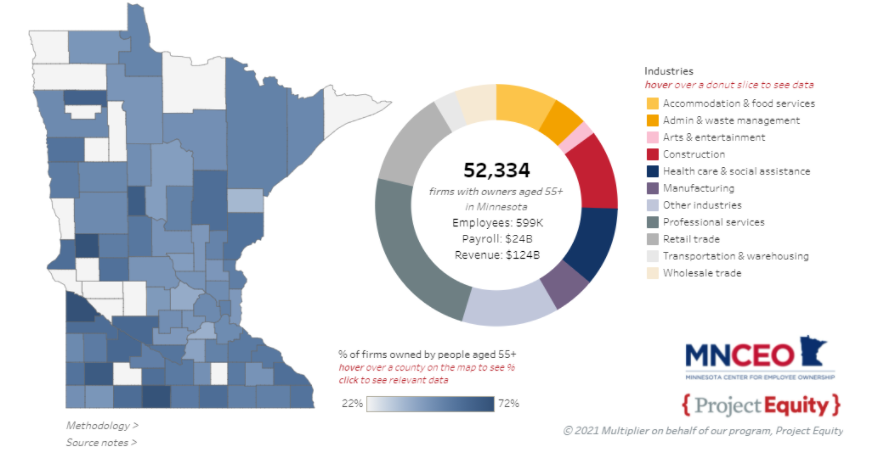New data shows Minnesotans over 55 own 52,000 local businesses
by Karen Kahn

The Minnesota Employee Ownership Center launched in January 2020. It might not seem like propitious timing, but after a year of Zoom presentations, Executive Director Sue Crockett says, “We’ve been able to reach a substantial number of business services professionals this year and give them a better understanding of the role employee ownership can play in succession planning.”
That work is about to ramp up, with new funding from the Minnesota-based McKnight Foundation. The foundation awarded the center $50,000 to support its outreach and education program. MNCEO plans to use these funds to expand its toolbox, hiring a videographer to tell stories, using media spots to reach a wider audience, and, of course, planning for in-person meetings with professional associations and community leaders as COVID restrictions recede.
This funding from the McKnight Foundation empowers us to amplify awareness of employee ownership as a valuable, flexible succession tool.”
–Sue Crokett, Executive Director of MNCEO
“This funding from the McKnight Foundation empowers us to amplify awareness of employee ownership as a valuable, flexible succession tool that enables owners to sell their businesses to their employees while preserving its integrity and keeping the company rooted in its community,” said Crockett in a recent press release.
“In the wake of COVID-19, business owners are hungry for information on succession planning,” says Steve Storkan, executive director of the Employee Ownership Expansion Network (EOX), which partners with local leaders to establish state-based employee ownership centers. Minnesota is one of seven centers EOX has helped to establish since 2019.
As part of its work to support the state centers, EOX is partnering with Project Equity on state-based data studies. The first to be released is for Minnesota. The data study shows that half of Minnesota’s job-creating businesses are owned by baby boomers over the age of 55. In Minnesota, that is more than 52,000 businesses that employ nearly 600,000 people. It is expected that of these business owners, around 60 percent will seek to transfer ownership in the next decade. Many have moved up their timeline as a result of the challenges of the past year.
Importantly, the study breaks down this statewide data to show how many business owners are on the cusp of retirement in each of the state’s counties. MNCEO will be using its new funding from the McKnight Foundation to reach out to county economic development leaders to educate them about the succession crisis. Only about 15 percent of small businesses are passed on to family members, according to Project Equity. Of the remaining 85 percent, only about 20 percent will find a buyer. Those that are bought by competitors or private equity may be shutdown or moved out of state, hurting the local economy and erasing the lasting legacy a business owner could have if the business were to be sold to its employees.
Minnesota has about 255 Employee Stock Ownership Plans (ESOPs), according to Crocket. Additionally, the state has a handful of worker-owned cooperatives.
Plastic Products is an ESOP, whose CEO Ben Holder participated in one of the center’s webinars in April. Holder explained that Plastics Products had been a family-owned business. It became 30 percent employee-owned through an Employee Stock Ownership Plan (ESOP) in 1989. Then in 2013, the family made the decision to sell the rest of their shares to the ESOP Trust. The share price has since risen 269 percent, said Holder.
Holder emphasized that Plastic Products, which employs 1000 people at 10 plants around the country, has been pro-active in building its employee ownership culture. That has paid off in a high level of employee engagement and increased productivity.
The state center also works closely with the worker cooperative community. For many small businesses, an ESOP is not a viable structure. Local partners such as NEXUS Community Partners ensure that the state center is reaching into communities of color and offering solutions that work for small business owners. Happy Earth Cleaning, an environmentally friendly cleaning service, recently transitioned from an LLC to a worker cooperative, a change that worker-owner Tom Crouse credited with helping the business through this year’s recession. Said Crouse at the April webinar, “We received tremendous support from our customers who chose us for our sustainability practices and loved the idea of worker ownership.”
“State centers are filling an important need,” says Crockett. “We provide unbiased information to state leaders and to the business community. We aren’t trying to sell something. We want to expand everyone’s knowledge base so that when a business owner is considering his or her succession options, or a county official is thinking about economic development strategies, employee ownership is on the menu.”
Karen Kahn is a communications consultant and the editor of Employee Ownership News.
To follow Employee Ownership News, subscribe to the Fifty by Fifty newsletter or follow us at Medium.
